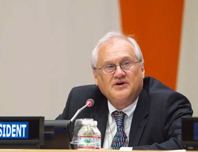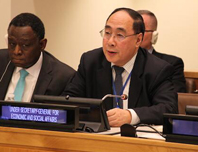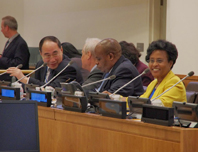DESA News
Volume 18, No.05 - May 2014
Global dialogue on development
 As the Open Working Group (OWG) process has transitioned from a stock-taking to a negotiation phase, the opportunity for civil society to have their inputs heard has become increasingly important. This was evident during the 10th session of the OWG on Sustainable Development Goals (SDGs) which took place on 31 March – 4 April. This work will continue during the next session, scheduled to take place in New York on 5-9 May.
As the Open Working Group (OWG) process has transitioned from a stock-taking to a negotiation phase, the opportunity for civil society to have their inputs heard has become increasingly important. This was evident during the 10th session of the OWG on Sustainable Development Goals (SDGs) which took place on 31 March – 4 April. This work will continue during the next session, scheduled to take place in New York on 5-9 May.
During a one and a half hour long meeting at the 10th session with the Open Working Group Co-Chairs, Major Groups and other stakeholders were able to make their suggestions for specific goals and targets for consideration by the Co-Chairs and Member States.
The session was designed to directly address the document outlining the focus areas, while also acknowledging the important differences between constituency needs. Using google docs, focus areas statements were developed in an open and transparent way, enabling constituents and organizing partners alike to have their say in the views expressed in each intervention. The focus area statements were also produced in consultation with other stakeholders to provide both breadth and depth to each statement. The constituency-based statements were developed in consultation with each party and organizing partner.
All of these statements were subsequently integrated into a compilation document, along with a brief summary, both of which were consulted upon with MGoS before release to the Co-Chairs. A programme of work for future sessions was released at the end of the 10th session, delineating the tasks ahead, and since then, a new focus areas document has been produced, which will serve as the basis for negotiations moving forward.
Major Groups look forward to participating in the upcoming OWG11 session, the date and time of such participation still remains to be finalized. They are committed to staying flexible during negotiations and appreciate the hard work and dedication of the Co-Chairs in being inclusive and open as the OWG process continues on.
For more information:
Eleventh session of the Open Working Group on Sustainable Development Goals
Open Working Group on Sustainable Development Goals

This year’s annual observance of the International Day of Families on 15 May celebrates the 20th anniversary of the International Year of the Family, which was held in 1994.
The preparations for this landmark anniversary is being carried out by the Focal Point on the Family, in UN DESA’s Social Policy and Development Division and aims to achieve a greater recognition that families should be a focus of social policy for the sake of present and future generations. The event seeks to raise awareness of the importance of families, to promote knowledge of socio-economic and demographic trends affecting families and stimulate efforts to respond to challenges faced by families.
The major policy areas under recent consideration include: family poverty, social exclusion and inter-generational transfer of poverty; work-family balance, including unpaid work at home and the sharing of household responsibilities between parents as well as a variety of inter-generational issues. There is ample evidence that policies in those areas are effective, contribute to the achievement of internationally agreed development goals and should be advanced further.
The theme of this year’s International Day is Families Matter for the Achievement of Development Goals. No doubt, a myriad of development goals, ranging from poverty and inequality reduction, education, maternal and child health require greater focus on families. Inter-generational transfer of poverty occurs at the family level; inequality is perpetuated when families don’t have access to health services and can’t send their children to school. It is at the family level, where decisions about educating girls take place.
Yet, although families face mounting challenges, they are rarely a focus of systematic research and evidence-based policy making. What’s more, there have been inadequate efforts to assist families in fulfilling their numerous and indispensable functions. That is why the observance of this year’s International Day of Families is to encourage a more concerted action on the part of Governments and civil society to add families to post-2015 development agenda.
The observance of the Day is to sum up and illustrate recent contributions of civil society, Governments, academic institutions and the private sector to the well-being of families worldwide. The observance will feature a panel discussion focusing on building better public policy for families by communicating research to policymakers and feature contribution of civil society to the benefit of families globally. A landmark publication, “Family Futures” by Tudor Rose in observance of the anniversary, will be featured together with two brief documentaries on the role of civil society.
The event is organized in cooperation with the UN Department of Public Information.
For more information: International Day of Families
 The 2014 Special high-level meeting of the United Nations Economic and Social Council (ECOSOC) with the World Bank, IMF, WTO and UNCTAD was held on 14-15 April in New York under the overall theme of “Coherence, coordination and cooperation in the context of financing for sustainable development and the post-2015 development agenda.”
The 2014 Special high-level meeting of the United Nations Economic and Social Council (ECOSOC) with the World Bank, IMF, WTO and UNCTAD was held on 14-15 April in New York under the overall theme of “Coherence, coordination and cooperation in the context of financing for sustainable development and the post-2015 development agenda.”
Following the opening remarks by ECOSOC President Martin Sajdik and Deputy Secretary-General Jan Eliasson, a Ministerial segment was held on the theme “World economic situation and prospects” and two informal thematic debates focused on “Mobilization of financial resources and their effective use for sustainable development” and “Global partnership for sustainable development in the context of the post-2015 development agenda”. A multi-stakeholder dialogue on the way forward took place on the second day of the meeting.
World economic situation and prospects
The Ministerial segment started with a presentation on the World Economic Outlook (WEO) by Mr. Thomas Helbling, Chief of the World Economic Studies Division at the International Monetary Fund (IMF). The discussion highlighted that the recovery from the global economic and financial crisis was under way but remained weak and fragile. Additionally, trends in economic growth are still very uneven between countries.
While advanced economies are back on the recovery track, emerging markets are under significant pressure. In addition to long-term structural factors, cyclical factors are at play, including through possible adaptions of monetary policies in the United States. Participants stressed the need for greater cooperation and coherence in macroeconomic policies, and for strengthened multilateralism. They also cautioned that despite improved global growth, the global employment situation remained bleak, especially among young people, and inequalities continued to grow.
Mobilization and effective use of financial resources for sustainable development
At the start of the session, the two co-chairs of the Intergovernmental Committee of Experts on Sustainable Development Financing presented the advances made by the Committee. Mr. Mahmoud Mohieldin introduced the analytical work and policy recommendations of the World Bank on sustainable development financing in the context of the post-2015 development agenda. Participants agreed that the mobilization of resources for sustainable development depended on strengthened international cooperation anchored in a coherent financing framework. In this context, they emphasized the important role of and the third international conference on financing for development.
The Monterrey Consensus and the Doha Declaration will serve as a conceptual basis for an updated financing framework for the post-2015 agenda. Many participants underscored the need to employ the full range of financing sources and non-financial means available, including private and public, domestic and international, while taking into consideration their different characteristics, rationales and specific strengths. The importance of Official Development Assistance (ODA) was underlined.
Participants also welcomed the recent rise in ODA and called for more progress to meet the target of 0.7 per cent of GNI. In addition, there were calls for governance reforms at the global level, for a fair multilateral trading system and a stable global financial system. Greater international cooperation on tax matters to curb tax evasion and illicit financial flows will also be needed. Several speakers highlighted the role of private sector financing to contribute to sustainable development. However, public policies would need to set the right incentives to support private sector investment in sustainable development.
Global partnership for sustainable development in the context of the post-2015 development agenda
Ambassador George Talbot (Guyana) briefed the audience on the ongoing consultations on the preparations for the third international conference on financing for development. Mr. Serge Tomasi introduced the work undertaken by the OECD Development Assistance Committee to modernize the definition and measurement of development finance. There was a general agreement that a renewed and strengthened global partnership for sustainable development would be crucial to support the implementation of the post-2015 development agenda.
Such a partnership would need to contain strong monitoring and accountability mechanisms. The upcoming third international conference on financing for development will be a crucial opportunity to promote the new global partnership with a holistic and comprehensive financing framework. Many speakers stressed that global governance and the voice and representation of developing countries in economic decision-making bodies would need to be improved as a matter of urgency.
The outcome of the meeting will be a summary by the President of ECOSOC, which will be issued as an official UN document and will serve as an input to further discussions in the Council and the General Assembly. The summary will also inform the work of the Intergovernmental Committee of Experts on Sustainable Development Financing and the preparatory process of the third international conference on financing for development.
For more information: ECOSOC Special high-level meeting with the World Bank, IMF, WTO and UNCTAD

The Commission on Population and Development concluded its 47th session on 12 April. This year’s session focused on the “Assessment of the status of implementation of the Programme of Action of the International Conference on Population and Development”.
The meeting was held only a few months ahead of the 20-year anniversary of the largest intergovernmental conference on population and development ever held – the International Conference on Population and Development (ICPD) in Cairo in 1994.
In his opening remarks, UN Deputy Secretary-General Jan Eliasson said that the 1994 Conference had placed individuals’ rights and dignity at the heart of development and had advocated an agenda for inclusive and equitable growth. Chef de Cabinet Ms. Paulette Bethel, speaking on behalf of Mr. John W. Ashe, President of the General Assembly, noted that the General Assembly had decided to extend the Programme of Action beyond 2014, due to the gaps in implementation. She called on Member States to respond to new challenges as outlined in the operational review of the implementation of the Programme of Action, undertaken by the United Nations Population Fund (UNFPA) in consultation with Member States, the United Nations system and other relevant international organizations.
Mr. Wu Hongbo, UN DESA’s Under-Secretary-General, remarked that the Assembly’s special session in September will be an opportunity to renew political support for the goals of the ICPD Programme of Action and to define the work of the UN in the field of population and development for years to come. Mr. Babatunde Osotimehin, Executive Director of UNFPA recalled that the Cairo consensus had been part of a forward-looking agenda to empower women and girls. The outcome of this Commission, he noted, should be judged by whether we can bring the promises of 1994 to all.
In a keynote address, Nafis Sadik, Special Envoy of the Secretary-General for HIV/AIDS in Asia and the Pacific and Secretary-General of the ICPD in 1994, said it was not sufficient to plan for the 200 million women who lacked reproductive health care today. Policymakers should also look at the needs of girls entering reproductive age in the coming decades and stressed that the biggest single obstacle to better public health is prejudice and discrimination by society against girls and women.
In the Commission’s general debate, Member States reaffirmed their commitments to the goals and objectives of the ICPD Programme of Action and shared their national experiences, recounting their progress in implementing the Cairo consensus as well the challenges that were remaining in further implementing ICPD beyond 2014. Building on the report of the Secretary-General on world demographic trends prepared for this meeting, the debate focused on fertility and family planning, mortality, including HIV/AIDS, urbanization, migration, adolescents and youth and ageing.
Member States stressed their progress in enhancing access to reproductive health, reducing maternal and infant mortality, containing the spread of HIV, as well as improvements in women and girls’ education and gender equality. They also identified remaining gaps in implementation, such as the need to further improve access to reproductive health services, including family planning, reduce the number of unwanted pregnancies and unsafe abortions, as well as provide sexual education to young people. They referred to the challenges and opportunities of population dynamics, including population ageing, the youth bulge, the demographic dividend, international migration, and urbanization. Member States also called for the Cairo consensus to be fully integrated into the post-2015 development agenda and the new sustainable development goals and for placing people at the center of the development debate.
In accordance with General Assembly resolution 67/250, which had called for effective participation of civil society in the meeting, more than 800 NGO participants registered for this year’s Commission, setting a new record in NGO participation in CPD meetings. Almost 30 NGOs made statements during the plenary meeting, which contributed to a lively general debate.
The Commission adopted a resolution by consensus on the theme of the session that “calls upon Governments to recognize the important linkages between the priorities of the ICPD Programme of Action and sustainable development and to build on progress made and experiences gained from its implementation over the last twenty years in the elaboration of the post-2015 development agenda”. It also “reiterates that increased political will from all Governments is urgently needed to address existing gaps in the implementation of the ICPD Programme of Action and to respond to new challenges relevant to population and development”.
The deliberations and outcome of this 47th session represent a key contribution to the preparations for the General Assembly’s special session on ICPD Beyond 2014 in September and a fundamental input to the final phase in the preparations of the post-2015 development agenda and the sustainable development goals.
The 48th session of the Commission in 2015 will be chaired by H.E. Ms. Bénédicte Frankinet, Permanent Representative of Belgium to the United Nations. The session will be devoted to the theme “Realizing the Future We Want: Integrating Population Issues into the post-2015 UN-Development Agenda”.
For more information: Commission on Population and Development
 The 13th session of the UN Committee of Experts on Public Administration (CEPA) was held at UN Headquarters on 7-11 April, focusing on the main theme of “transforming public administration for sustainable development”.
The 13th session of the UN Committee of Experts on Public Administration (CEPA) was held at UN Headquarters on 7-11 April, focusing on the main theme of “transforming public administration for sustainable development”.
During this session, the discussions focused on three sub-themes: (a) strengthening national and local capacities for sustainable development management; b) promoting leadership, innovation and risk management; and (c) invigorating the professionalism and morale of the public service. In addition, the Committee also reviewed the United Nations Programme on Public Administration and Finance and provided recommendations for enhancement of the program.
The Committee acknowledged the crucial role of strengthening the national and local capacities of governments in transforming public administration. Its members also noted that governance, rule of law, capable institutions are both outcome and enabler to advance all three pillars of sustainable development and the post-2015 development agenda. At the same time, they highlighted that any future sustainable development goals should be translated and adapted at the national level in accordance with the conditions and priorities of each country. The Committee recommended that Member States ensure adequate capacity to identify governance risks; to experiment and adapt in response to successes and shortcomings; and to ensure a match between resources and responsibilities.
CEPA further recognized that strong political will and leadership are critical for promoting renovation in public administration and for implementing sustainable development. To achieve sustainable development objectives, there has to be a continuity of effective policies and implementation mechanisms in the medium to long term. Moreover, given the complexity of ever more challenging demands, technological and analytical tools should be used as instruments to support decision-making to enable innovative decisions. In view of this, the Committee recommended improvement of awareness and training in the field of ICT, as well as the promotion of e-government as the enabler of more efficient, transparent, participatory and accountable governance.
With regard to strengthening professionalism and morale in public sector, CEPA suggested that the UN could initiate discourse on the need for a strong and effective government in public service and civil society alike for the pursuit of sustainable development. It emphasized the need to promote knowledge-exchange among relevant institutions to build human resource capacity and promote professionalism and improve morale in public service. Acknowledging the critical need for promoting codes of conduct and ethical norms and values, the Committee advised the Secretariat to continue promoting regional and national charters of public service.
For the next year’s 14th session of CEPA to take place from 20 to 24 April 2015, the Committee agreed on the main theme of “Building public trust”, but recommended that more specific topics would be identified later upon further study and reflection.
For more information: 13th session of the UN Committee of Experts on Public Administration (CEPA)
 As the Open Working Group (OWG) process has transitioned from a stock-taking to a negotiation phase, the opportunity for civil society to have their inputs heard has become increasingly important. This was evident during the 10th session of the OWG on Sustainable Development Goals (SDGs) which took place on 31 March – 4 April. This work will continue during the next session, scheduled to take place in New York on 5-9 May.
As the Open Working Group (OWG) process has transitioned from a stock-taking to a negotiation phase, the opportunity for civil society to have their inputs heard has become increasingly important. This was evident during the 10th session of the OWG on Sustainable Development Goals (SDGs) which took place on 31 March – 4 April. This work will continue during the next session, scheduled to take place in New York on 5-9 May.



